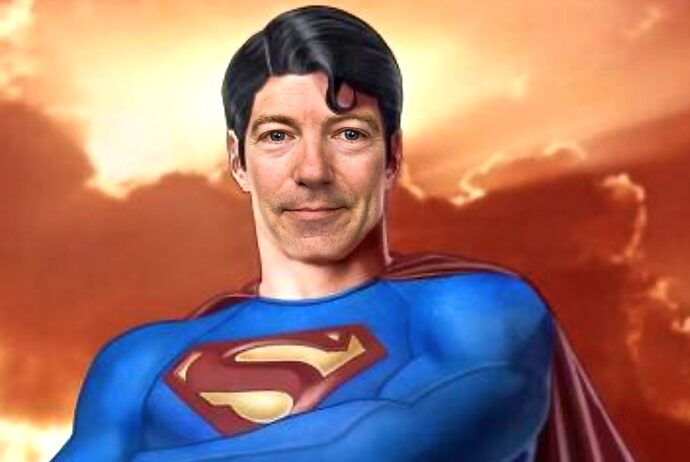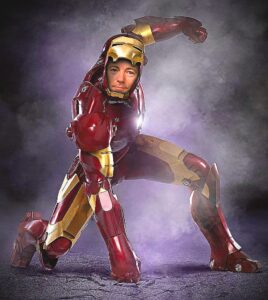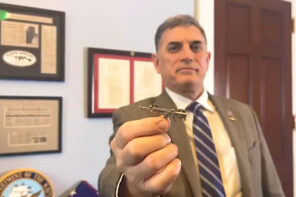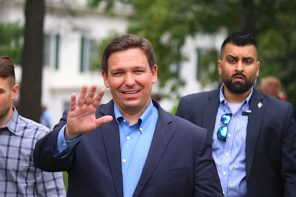The unique spectacle that is the presidential election season entered a whole new realm of fantasy last week with the dissemination of “A Different Kind of Republican Leader,” the official Rand Paul campaign trailer.
Painting Paul as a kind of superhero—framed against garish red light with a thumping guitar and synth soundtrack—reminiscent of Tony Stark at the end of the first Iron Man movie, declaring the super-robot’s true identity and smirking up a new audience for himself.
Paul is decidedly not an enthralling public speaker, but the music and quick-cut edits aim to compensate in an attempt to convince younger Republicans, primed by the cinematic comic book universe, to latch onto a new kind of hero.
The notion that there actually could be such a thing is, of course, unquestioned in campaign season (which these days, it seems, is all days). So there’s no need for the video to go to the trouble of seriously engaging with any issues. Instead, it has other commentators speak for Paul; in extracted footage of television news programs, luminaries are shown saying nice things about the candidate.
It’s a smart move—though having Newt Gingrich call you “the most consistently principled person” may not count for much .
.
The bigger coup is to have Jon Stewart, in footage from The Daily Show briefly quoted saying, “He’s out there using the filibuster the way it’s meant to be used.” Such willingness to speak well of political opponents is typical of Stewart, though I doubt he intended it to be a campaign sound clip used to endorse a candidate whose policy positions are frequently opposed to those espoused by Stewart’s audience (or the comedian himself).
The Paul campaign video is audibly grating and visually ugly. (That the garish red cut-out used to evoke Paul’s stature as a mystery Messiah looks more like the devil in Carlos Reygadas’ Post Tenebras Lux, probably wasn’t what they had in mind.) Aesthetics aside, what’s surprising is how similar is the video’s message is to other campaign capsules.
The Message: Washington is corrupt and I’m the savior.
The Medium: Sort-of-kind-of-maybe appealing to younger people.
Candidates always say we need a reformation, unless they want to be kind to the incumbent. Thus Paul recites his mild variation on the usual rote declamation:
“It’s time for a new way, a new set of ideas…and above all it’s time for a new president.”
We’re invited to “Join the movement.” The latter notion worked so well for candidate Obama, although his campaign struggled to figure out how to translate the energy of so many young people into practical action after the inauguration.
But the key difference between Paul’s rhetoric and the last successful presidential campaign is how Paul centers the appeal on the idea that he can do the saving.
No time for “YES WE CAN” here. It’s all about him.
As we know, superheroes are not immune to challenge. Magical powers can fade or be subject to the unpleasant side effects of kryptonite. Seeing yourself as savior of the world means there’s never a moment’s peace. And, as proxies for the American spirit—Iron Man (privileged and cosseted), Superman (the alien trying to blend in), or (Spider-Man) the ordinary kid in extraordinary circumstances—have discovered, eventually there will be a time of great inner suffering.
Like Jesus in the wilderness, at some point all superheroes end up in a fortress of solitude.
Stark’s ego, Clark Kent’s desire to be in touch with his heart, and Peter Parker’s inability to be all things to all people result in precarious life transitions. Stark is humbled, Kent realizes he actually can’t be fully human and also be a superhero, and, in perhaps the most mature response, Parker gets some help from the average Joe or Josephine, relying on their higher selves to keep quiet about who he really is.
That’s what I like about Spider-Man. He lives among ordinary people, and comes to understand what the philosopher Dallas Willard meant by the “range of his effective will.”
Presidential candidates have to believe (or pretend they believe) that they can save the world, even though we know (and they know) that they can’t. And it’s too easy for the public to default to complicity in this circle of untruths.
The echoes of Messianic movement-building in the Rand Paul video (and surely in many more to come from candidates of all political stripes) aren’t just clichéd. They’re disconnected from any idea of movement that would put into practice a vision of a new America.
In a time when the Republican Party’s strategy has been to obstruct any big Democratic legislation, when gridlock in DC seems un-fixable, and when local communities are taking more responsibility for social transformation, it seems awfully old-fashioned to suggest that parachuting the right guy into the White House will heal all ills.
This isn’t the kind of hero we need.
A healthy religion, and a healthy politics, produces leaders who are willing to face their shadow side, build teams across lines of difference, lament wounds, educate and inspire for the common good, neither by appealing to the notion of a “real America” to which “others” don’t belong, nor by pretending they are without imperfection.
The rabbi and leadership consultant Edwin Friedman taught that the purpose of leadership is to induce the conditions whereby the audience could become emotionally mature. He’s right, but Presidents don’t get elected by asking their base to take more responsibility for their lives.
At least not yet.
Photo illustration of Rand Paul as Iron Man by Cathleen Falsani, using Pho.to.com template, and Rand’s official U.S. Senate photo.






